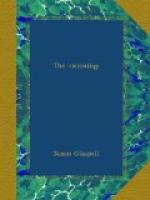They were all very quiet on the way home.
That night just as she was falling asleep Katie was startled. It seemed at first she was being awakened by a sharp dart, one of those darts of apprehension seemed shot into her approaching slumber. But it was nothing more than Wayne whistling out on the porch, whistling the dreaming waltz which would bear one to the love waiting at the heart of the night.
But Katie was sleepy now. How did Wayne expect any one to go to sleep, she thought crossly, whistling at that time of night.
But across the hall was another girl who listened. She had not been asleep. She had been lying there looking out into the night, very wide awake. And when she heard the whistling she too sat up in bed, swaying ever so gently to the rhythm of it, inarticulately following it under her breath and smiling a hushed, tender little smile. Something lovely seemed stealing over her. But in the wake of it was something else—something cold, blighting. Before he had finished she had covered her ears with her hands, and was sobbing.
CHAPTER XV
As she looked back afterward upon that span of days, searching them, translating, Katie saw that the day of the golf and the dancing marked the farthest advance.
After that it was as if Ann, frightened at finding herself so far out in the open, shrank back into the shadows. But having gone a little way into the open she was not again the same girl of the shadows. Her response to life seeming thwarted, there came an incipient sullenness in her view of that life which she had reached over the bridge of make-believe.
It did not show itself at once, but afterward it seemed to Katie that the next day marked the beginning of Ann’s retreat on the bridge of make-believe.
And she wondered whether the stray dog or the dangerous literature had most to do with that retreat.
Ann was pale and quiet the day after the dance, and it was not merely the languor of the girl who has fatigued herself in having a good time.
At luncheon Katie suddenly demanded: “Wayne, where do you get dangerous literature?”
“I don’t know what form of danger you’re courting, Katie. I have a valuable work on high explosives, and I have a couple of volumes of De Maupassant.”
“Oh I weathered all that kind of danger long ago,” said she airily. “I want the kind that is distressing editors of church papers. The man who edits this religious paper uncle sends me is a most unchristian gentleman. He devoted a whole page to talking about dangerous literature and then didn’t tell you where to get it. Well, I’ll try Walt Whitman. He’s very popular in the West, I’m told, and as the West likes danger perhaps he’s dangerous enough to begin on.”
“And you feel, do you, Katie, that the need of your life just now is for danger?”
“Yes, dear brother. Danger I must have at any cost. What’s the good living in a dangerous age if you don’t get hold of any of the danger? This unchristian editor says that little do we realize what a dangerous age it is. And he says it’s the literature that’s making it so. Then find the literature. Only he—beast!—doesn’t tell you where to.”




